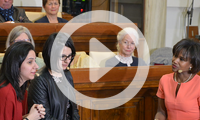
Maria Belen Zanzuchi
Associate Policy Analyst, MPI Europe
María Belén Zanzuchi is an Associate Policy Analyst at MPI Europe, where she conducts research on refugee protection pathways, including resettlement, community sponsorship, and complementary pathways, and migrants' integration.
Previously, she worked with the Humanitarian Corridors Initiative at the University of Notre Dame, which evaluated humanitarian corridors in Italy and assessed whether these programs could serve as a model for migrant integration elsewhere in Europe. Ms. Zanzuchi also worked as an Economic Advisor to the Secretary of Commerce of Argentina, focusing on issues related to anti-trust policies, trade agreements, and sectorial policies, and coordinating with private and public stakeholders.
Ms. Zanzuchi has a master’s degree in sustainable development from the University of Notre Dame, with a focus on refugee and migrant studies, and a bachelor’s degree in economics from the Universidad Torcuato di Tella in Buenos Aires.
Bio Page Tabs
With the Global Refugee Forum approaching, this webcast explores how municipalities and other key stakeholders can be engaged in informing and delivering on the 2024 resettlement and complementary pathways pledges.








